     
|
Pradelles, stage of the GR®70 Stevenson Trail
|
     
|
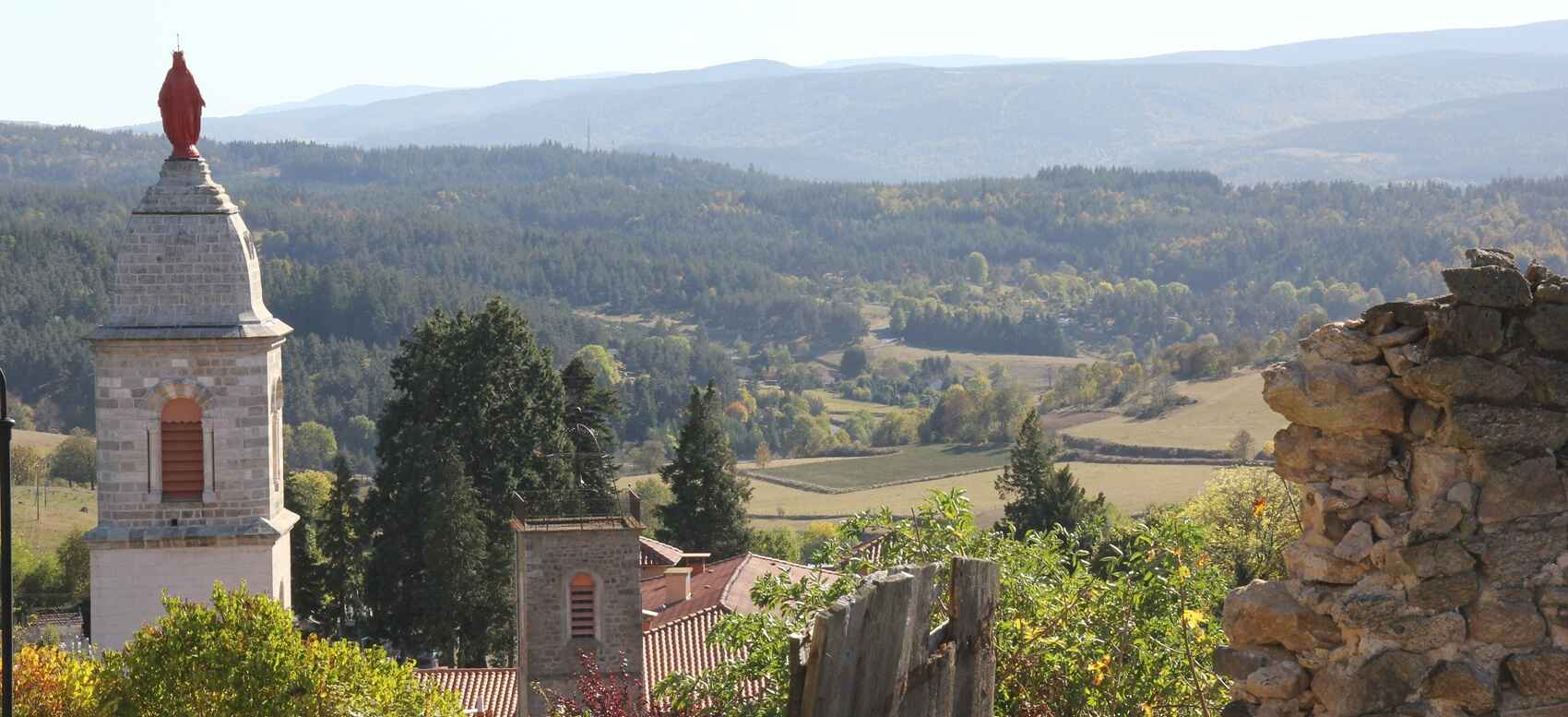
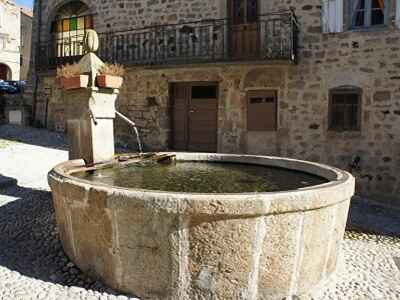 Pradelles is what one usually calls "a pretty village in France," perhaps a bit caricatured, proud of its past and where one must be dreadfully bored. The medieval streets are filled with decorated balconies, artistic ironwork, and bouquets of flowers. The Halles square and its arcades. Foirail square with its light-colored houses. Squares, cobblestones from yesteryear, winding streets. A touristy air. Pradelles the charming is the perfect place to stage a costume film. They say Mandrin and his gang came here to "make some noise." Here’s a beautiful battle scene between bandits and generous farmers. Action!
Pradelles is what one usually calls "a pretty village in France," perhaps a bit caricatured, proud of its past and where one must be dreadfully bored. The medieval streets are filled with decorated balconies, artistic ironwork, and bouquets of flowers. The Halles square and its arcades. Foirail square with its light-colored houses. Squares, cobblestones from yesteryear, winding streets. A touristy air. Pradelles the charming is the perfect place to stage a costume film. They say Mandrin and his gang came here to "make some noise." Here’s a beautiful battle scene between bandits and generous farmers. Action!
 We set up camp at the Café de l'Univers - near the Casino grocery store. Past elegance, mirrors, woodwork, Belle Époque spirit, and in the back room, a pleasant view of the valley. It’s market day, and Noée leisurely observes the farmers and their inviting stalls. At the bar, four sturdy men from Pradelles take their time to have five aperitifs between ten thirty and eleven fifteen. Then they will return home to... have an aperitif before sitting down to dinner. At departure time, one of them, a vehement giant, exclaims, gets worked up, and gets angry. Reason: the Red Inn.
We set up camp at the Café de l'Univers - near the Casino grocery store. Past elegance, mirrors, woodwork, Belle Époque spirit, and in the back room, a pleasant view of the valley. It’s market day, and Noée leisurely observes the farmers and their inviting stalls. At the bar, four sturdy men from Pradelles take their time to have five aperitifs between ten thirty and eleven fifteen. Then they will return home to... have an aperitif before sitting down to dinner. At departure time, one of them, a vehement giant, exclaims, gets worked up, and gets angry. Reason: the Red Inn.
- Idiots, I would have settled the score with Martin, idiots, I tell you. It’s like in war or pétanque, you have to anticipate!
The wild Gévaudan is not far away, and in the cafés, people still talk about the sinister inn and the "beast." Some claim to encounter it on full moon nights. Everyone has their opinion, and each time it’s the right one. On this market day, the serial crimes of the Peyrebeille inn occupy the conversation. A story two centuries old, nonetheless! The giant is put back in his place by a second pillar.
- You're just as stupid as they are; you wouldn't have changed anything...
The first one is offended, and it starts up again. To calm the spirits, the "boss" offers the "last round" and proposes a new debate. Our fighters now exchange their viewpoints on the match from the previous day. And here we go again. Hard to separate them.
- Idiots too, I tell you...
Conversations on loop, no matter the subject. And they order another round. The last one. Wooden cross, iron cross. At least the seventh one. When you love...
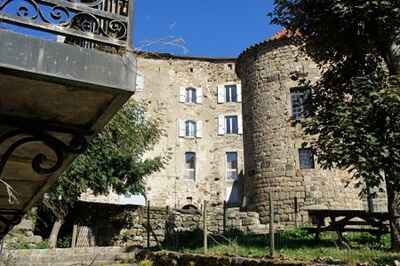 The Café de l'Univers accepts in its cenacle all the "news" from the planet and the Gévaudan. You can read Le Centre, La Montagne, and Le Réveil de la Haute-Loire, one of the few departmental newspapers alongside Le Journal de la Haute-Marne. For five days now, our world has been reduced to frantic marches, childhood memories, and mischievous weather reports. Meanwhile, in ex-Yugoslavia, children and women play hide-and-seek with war. Europe watches and films them. Without comment. Before leaving the noisy café, I note down names unknown in France, printing smudges. Fahrudin, Jusuf, Asirn, Dalibor, Mirko - which means the man of peace - Franjo, Izudin, Gara. Once, they were Croatian men and women, Muslims, Serbs, or Bosnians, indiscriminately. This morning, they are names that accumulate, which no longer matter. Names without owners. The dead. Smudges.
The Café de l'Univers accepts in its cenacle all the "news" from the planet and the Gévaudan. You can read Le Centre, La Montagne, and Le Réveil de la Haute-Loire, one of the few departmental newspapers alongside Le Journal de la Haute-Marne. For five days now, our world has been reduced to frantic marches, childhood memories, and mischievous weather reports. Meanwhile, in ex-Yugoslavia, children and women play hide-and-seek with war. Europe watches and films them. Without comment. Before leaving the noisy café, I note down names unknown in France, printing smudges. Fahrudin, Jusuf, Asirn, Dalibor, Mirko - which means the man of peace - Franjo, Izudin, Gara. Once, they were Croatian men and women, Muslims, Serbs, or Bosnians, indiscriminately. This morning, they are names that accumulate, which no longer matter. Names without owners. The dead. Smudges.
"Passerby! Take a look at this infamous farm, / For it was here, once, that death awaited you! / The refuge house was the den of crime, / And once the threshold was crossed, no soul
ever came out!" To the side of the counter, a small hunchbacked figure, wearing a hat and up to now silent, begins to recite a quatrain from the Grand Guignol. The fine speakers stop and
sigh.
 - I'm going to tell you the story! Just like that! A new clamor arises from the audience: "You've already told it a hundred times!" An astonishing colloquium is getting ready. Here, too, one
learns. The student is working with his elbow and skillfully revising his license IV, far from the Sorbonne displays. The hunchback adjusts his cap, orders another glass of anise, assesses the perplexed audience,
and begins his presentation...
- I'm going to tell you the story! Just like that! A new clamor arises from the audience: "You've already told it a hundred times!" An astonishing colloquium is getting ready. Here, too, one
learns. The student is working with his elbow and skillfully revising his license IV, far from the Sorbonne displays. The hunchback adjusts his cap, orders another glass of anise, assesses the perplexed audience,
and begins his presentation...
In this wild and depopulated Ardèche, in the heart of Vivarais where winters are still so harsh, the Martins and their servant engage in a very strange business. Owners of the Peyrebeille inn, a sinister
granite house with few openings to better protect itself from the cold, a veritable den of thieves, where the price for lodging is cheap. The owners increase their revenue by methodically robbing and
murdering lost travelers. Pierre Martin, a brutal man, is assisted in his grim task by Marie Martin, his wife, and Jean Rochette, the servant, nicknamed "the mulatto" or "the darky," although he is pure Ardèche. His dark skin and negroid features evoke a cannibal!
Like the butchers of the Grand Châtelet in the Middle Ages, the trio rules by terror over a fearful and silent region. All roads lead to the inn... One road goes from Auvergne to the Rhône valley, the other from Haute-Loire to Lozère. At the crossroads of the two roads, on a windy, deserted high plateau, stands the bloody den - here would benefit from a dramatic cymbal crash! It was in 1808 that the sad idea first came to them...
 The storyteller pauses, glances in our direction, tips his glass once again, and continues.
The storyteller pauses, glances in our direction, tips his glass once again, and continues.
- Napoleon is looking for brave men to satisfy his appetite for conquest. The men fit for war - they all are - are enlisted by the dozen. A few, cowardly or clear-headed, prefer to take to the fields. One of them, who comes to hide at the inn with all his wealth, has a bad time. The stranger is comforted with hot wine and a good fire... The man has money, talks too much, so the mulatto strangles him with a leather strap. The body is abandoned in a crevice in front of the inn. It won’t be found until spring. Many
meet the same fate. For twenty-five years, you hear me, twenty-five years, the monsters strangle, slaughter, and wipe the blood off the ground with the victims' shirts! Dozens and dozens... Not to mention the others, those who were never found!
Çà and là, pieces of bodies torn apart by wolves are uncovered. They whisper, of course, but conclude that there are "lost travelers" in the storm. However, the inn of the Martins is never far away, just a few leagues at most...
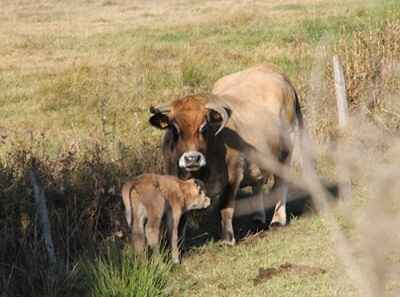 When the victims are not left to nature, the monsters burn the bodies in their bread oven and scatter the ashes to the wild winds. Fear settles in, and the gendarmes investigate in vain. The cart drivers tell tales... Strange things happen in the cursed area. Only Father Martin is feared, and he knows how to silence the chatterers. No one dares to poke their nose into his business.
When the victims are not left to nature, the monsters burn the bodies in their bread oven and scatter the ashes to the wild winds. Fear settles in, and the gendarmes investigate in vain. The cart drivers tell tales... Strange things happen in the cursed area. Only Father Martin is feared, and he knows how to silence the chatterers. No one dares to poke their nose into his business.
— Young folks, do you like this? Each gives their opinion, and the aniseed speaker continues with even more vigor. Towards the horrible inn.
— I continue! The Empire and the Restoration pass. Louis-Philippe settles in, but the disappearances do not stop. People tremble in Vivarais. A peasant claims to have seen the Martins cooking some strange meat in a large pot.
Every winter, the weather reclaims its rights and the trio their infamous tasks. It’s a bovine that, in 1831, will lose its butchers. Ah, the cursed ones! Martin buys a cow from Antoine Anjolras, a farmer from Saint-Paul-de-Tartas, at the border of Ardèche and Haute-Loire, without paying for it. On October 12, the two men meet at the market in Saint-Cirgues-en-Montagne. Martin promises to repay his debt. In the evening, at the inn. Additionally, he promises him a bottle of vinezac, his best wine. Anjolras agrees, and the two men return to the inn as night falls. It is terribly cold, the wind howls.
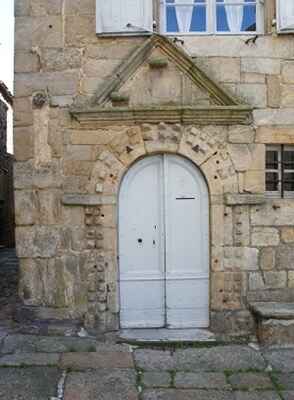 One evening, only witches and wolves should be left outside. Anjolras settles by the fire, and the promised wine is uncorked. It is then that Laurent Chaze, a former shepherd turned beggar, drunkard, and good for nothing, knocks on the inn's door. He asks for shelter for the night. Martin chases him away. Tonight, he doesn’t want any curious onlookers. The other pretends to disappear into the fog, then turns and heads to the Martins' barn. Discreetly... After the meal, Martin suggests to the old Anjolras to wait until morning to return to his farm and to sleep in the barn. It is terribly cold, and Anjolras agrees. In the night, it is the execution. The mistress throws a ladle of boiling water in his face, the mulatto crushes his skull and face with a heavy hammer. The mulatto and his master throw the body into a cloth sack and carry it on a donkey’s back to toss it into a ravine.
One evening, only witches and wolves should be left outside. Anjolras settles by the fire, and the promised wine is uncorked. It is then that Laurent Chaze, a former shepherd turned beggar, drunkard, and good for nothing, knocks on the inn's door. He asks for shelter for the night. Martin chases him away. Tonight, he doesn’t want any curious onlookers. The other pretends to disappear into the fog, then turns and heads to the Martins' barn. Discreetly... After the meal, Martin suggests to the old Anjolras to wait until morning to return to his farm and to sleep in the barn. It is terribly cold, and Anjolras agrees. In the night, it is the execution. The mistress throws a ladle of boiling water in his face, the mulatto crushes his skull and face with a heavy hammer. The mulatto and his master throw the body into a cloth sack and carry it on a donkey’s back to toss it into a ravine.
It is said that a traveler, Claude Pages, died of fright shortly after crossing the sinister procession. However, in the barn, Laurent Chaze had seen it all. He fled and was found in the villages rambling incoherently. He has seen everything, he repeats... One day he will speak. One day... Soon after, the corpse is found. The gendarmes investigate: this time, they do not believe it was an accident. The beggar Chaze spills the beans, and the malevolent trio is arrested a few days after the murder. Destination: Aubenas prison.
 The case was tried from November 1831 to February 1833, at the assize court in Privas. There, the entire district shares its story. More than a week of testimonies. Each one empties their bag. It takes the jury barely an hour to sentence the greedy monsters to death. They will be guillotined in front of the inn on October 2, in front of thirty thousand people, they say. Cheers of joy are heard when the heads fall into the baskets. Balls are organized in front of the inn, and they dance all night. Musicians have come all the way from neighboring villages. Savages watch the death of other savages. Before heading to the scaffold, Martin lets out one last curse: « Such a gathering will cause a lot of trouble for the Béage fair. » He kisses the crucifix and whispers to his accomplices: « It doesn’t matter since we have to die, then a little sooner or a little later...
The case was tried from November 1831 to February 1833, at the assize court in Privas. There, the entire district shares its story. More than a week of testimonies. Each one empties their bag. It takes the jury barely an hour to sentence the greedy monsters to death. They will be guillotined in front of the inn on October 2, in front of thirty thousand people, they say. Cheers of joy are heard when the heads fall into the baskets. Balls are organized in front of the inn, and they dance all night. Musicians have come all the way from neighboring villages. Savages watch the death of other savages. Before heading to the scaffold, Martin lets out one last curse: « Such a gathering will cause a lot of trouble for the Béage fair. » He kisses the crucifix and whispers to his accomplices: « It doesn’t matter since we have to die, then a little sooner or a little later...
To conclude his presentation, the man begins to sing: « Little shepherds full of sorrow / In the evening, be careful / There are human beasts / Wilder than wolves... »
— It’s a popular song that dates back to the time when Jesus Christ was a shepherd in Gévaudan. My grandmother still sang it when I was a child. It seems that it traveled all over France. When Joseph Vacher was killing shepherdesses, it was sung everywhere. The amphitheater emptied. The speaker bows and returns to the counter, without another word. At the moment of the bill, the café owner whispers so the other does not hear...
— Almost every day, he tells the story. Especially if there are newcomers. By now, he knows it by heart. That one and others even more far-fetched... When he finishes, the others know it’s time to sit at the table. Today the Red Inn is open for visits. You can eat there and buy very tasteless postcards. Reproductions of the plaster casts of the three severed heads, the guillotine that was erected in front of the inn. Lace at all prices. Lace. Welcome to Gévaudan, between paganism and macabre orality. Welcome to the storytellers.
This morning, one had to pretend to shiver... The sound of the hammer on the skull, the boiled bodies in the pot, the wolves, the wind. When the café empties, it still causes a stir. The village priest is not left out. With or without parishioners, the walls and the Stations of the Cross have the right to a sermon. Memory fades, but the hussars resist with only a well-trained tongue as their battle horse. In the square, the merchants fold their stalls and give us the leftovers of some unsold vegetables. Lucifugus Merklen had warned. It has to be fed at fixed hours, and it has to be bottled, hooves, fur, and teeth checked to avoid animal breakdowns. Hastily noted is the history of the Red Inn, the screams of the flayed, the giant knives. Outside, the vegetable vendors leave, and the butchers mock the giant knives.
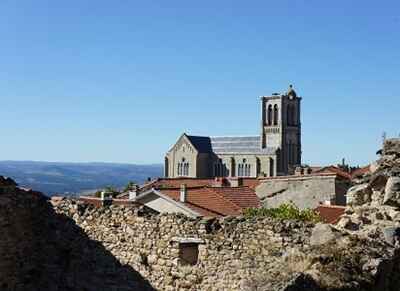 Leaving Pradelles, we avoid the GR 70 once again to better follow the course of a graceful river and its autumn whispers. After the church, we do not find the small white and red signs. Below, the clarity of the early afternoon reveals Langogne, the capital of Gévaudan. No need for a compass or a topographical map; it’s enough to glide straight toward the stop. We hesitate between the road and winding paths, but Noée makes her choice. She refuses to walk alongside the roaring cars. Higher up, on the slopes where the cars gather, the conifers serve as sparse vegetation. Some needleless fir trees stand tall, stretching their multiple arms, seeming to chase away any ferocious beasts — the spelling of Stevenson regarding the wolf or the monster. Thus, we follow the river. After the bloodbath, a sunbath awaits our getaway.
Leaving Pradelles, we avoid the GR 70 once again to better follow the course of a graceful river and its autumn whispers. After the church, we do not find the small white and red signs. Below, the clarity of the early afternoon reveals Langogne, the capital of Gévaudan. No need for a compass or a topographical map; it’s enough to glide straight toward the stop. We hesitate between the road and winding paths, but Noée makes her choice. She refuses to walk alongside the roaring cars. Higher up, on the slopes where the cars gather, the conifers serve as sparse vegetation. Some needleless fir trees stand tall, stretching their multiple arms, seeming to chase away any ferocious beasts — the spelling of Stevenson regarding the wolf or the monster. Thus, we follow the river. After the bloodbath, a sunbath awaits our getaway.
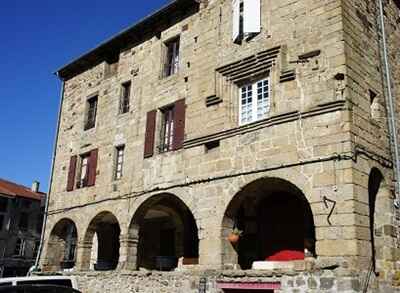 One leg is hurting me,
One leg is hurting me,
may it go to hell. The long journey becomes a journey of "cors." A brave path where dead ends do not exist. Light mood despite the pain. The watercourse whispers like a
carillon. Sylvan flânerie and sybaritism. When you walk, do you clear or decipher?...
Speaking of wasteland and figures. It was after World War II that Roger Beaumont and his wife Mireille imagined marking out France by painting it red and white. At that time, there were one hundred and fifty kilometers of registered paths, mainly along the Loire. This calm and kind couple would mark at their own pace and for almost a lifetime fifteen thousand kilometers of wild trails. These are the famous GR, long-distance hiking paths. Corsica on foot — the famous GR 20, the toughest of all — the Alps and the Tour of Mont Blanc, Chamonix-Menton, the Pyrenees, from the Atlantic to the Mediterranean.
Since then, other
good wills have taken over, other loving couples, and forty thousand kilometers of paths are now available for those who wish to discover safety away from the breathless rhythms. A
cordial salute to these two frenetic dreamers, Arthur and Zoé, on the rocky paths. This afternoon, autumn smells good, and the last rays tan my neck and head. I forget
my obligations, I'm an origami, a wild duck, a little paper boat, a flâneur approaching Langogne. In a few minutes, my river will flow into the Allier, leaving the memory of a sunny and simple drift. by Eric Poindron. Excerpt from "Belles étoiles" With Stevenson in the
Cévennes, Gulliver collection, directed by Michel Le Bris, Flammarion.
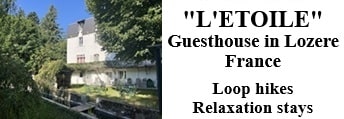
Former holiday hotel with a garden along the Allier, L'Etoile Guest House is located in La Bastide-Puylaurent between Lozere, Ardeche, and the Cevennes in the mountains of Southern France. At the crossroads of GR®7, GR®70 Stevenson Path, GR®72, GR®700 Regordane Way, GR®470 Allier River springs and gorges, GRP® Cevenol, Ardechoise Mountains, Margeride. Numerous loop trails for hiking and one-day biking excursions. Ideal for a relaxing and hiking getaway.
Copyright©etoile.fr

 Pradelles is what one usually calls "a pretty village in France," perhaps a bit caricatured, proud of its past and where one must be dreadfully bored. The medieval streets are filled with decorated balconies, artistic ironwork, and bouquets of flowers. The Halles square and its arcades. Foirail square with its light-colored houses. Squares, cobblestones from yesteryear, winding streets. A touristy air. Pradelles the charming is the perfect place to stage a costume film. They say Mandrin and his gang came here to "make some noise." Here’s a beautiful battle scene between bandits and generous farmers. Action!
Pradelles is what one usually calls "a pretty village in France," perhaps a bit caricatured, proud of its past and where one must be dreadfully bored. The medieval streets are filled with decorated balconies, artistic ironwork, and bouquets of flowers. The Halles square and its arcades. Foirail square with its light-colored houses. Squares, cobblestones from yesteryear, winding streets. A touristy air. Pradelles the charming is the perfect place to stage a costume film. They say Mandrin and his gang came here to "make some noise." Here’s a beautiful battle scene between bandits and generous farmers. Action! We set up camp at the Café de l'Univers - near the Casino grocery store. Past elegance, mirrors, woodwork, Belle Époque spirit, and in the back room, a pleasant view of the valley. It’s market day, and Noée leisurely observes the farmers and their inviting stalls. At the bar, four sturdy men from Pradelles take their time to have five aperitifs between ten thirty and eleven fifteen. Then they will return home to... have an aperitif before sitting down to dinner. At departure time, one of them, a vehement giant, exclaims, gets worked up, and gets angry. Reason: the Red Inn.
We set up camp at the Café de l'Univers - near the Casino grocery store. Past elegance, mirrors, woodwork, Belle Époque spirit, and in the back room, a pleasant view of the valley. It’s market day, and Noée leisurely observes the farmers and their inviting stalls. At the bar, four sturdy men from Pradelles take their time to have five aperitifs between ten thirty and eleven fifteen. Then they will return home to... have an aperitif before sitting down to dinner. At departure time, one of them, a vehement giant, exclaims, gets worked up, and gets angry. Reason: the Red Inn. The Café de l'Univers accepts in its cenacle all the "news" from the planet and the Gévaudan. You can read Le Centre, La Montagne, and Le Réveil de la Haute-Loire, one of the few departmental newspapers alongside Le Journal de la Haute-Marne. For five days now, our world has been reduced to frantic marches, childhood memories, and mischievous weather reports. Meanwhile, in ex-Yugoslavia, children and women play hide-and-seek with war. Europe watches and films them. Without comment. Before leaving the noisy café, I note down names unknown in France, printing smudges. Fahrudin, Jusuf, Asirn, Dalibor, Mirko - which means the man of peace - Franjo, Izudin, Gara. Once, they were Croatian men and women, Muslims, Serbs, or Bosnians, indiscriminately. This morning, they are names that accumulate, which no longer matter. Names without owners. The dead. Smudges.
The Café de l'Univers accepts in its cenacle all the "news" from the planet and the Gévaudan. You can read Le Centre, La Montagne, and Le Réveil de la Haute-Loire, one of the few departmental newspapers alongside Le Journal de la Haute-Marne. For five days now, our world has been reduced to frantic marches, childhood memories, and mischievous weather reports. Meanwhile, in ex-Yugoslavia, children and women play hide-and-seek with war. Europe watches and films them. Without comment. Before leaving the noisy café, I note down names unknown in France, printing smudges. Fahrudin, Jusuf, Asirn, Dalibor, Mirko - which means the man of peace - Franjo, Izudin, Gara. Once, they were Croatian men and women, Muslims, Serbs, or Bosnians, indiscriminately. This morning, they are names that accumulate, which no longer matter. Names without owners. The dead. Smudges. - I'm going to tell you the story! Just like that! A new clamor arises from the audience: "You've already told it a hundred times!" An astonishing colloquium is getting ready. Here, too, one
learns. The student is working with his elbow and skillfully revising his license IV, far from the Sorbonne displays. The hunchback adjusts his cap, orders another glass of anise, assesses the perplexed audience,
and begins his presentation...
- I'm going to tell you the story! Just like that! A new clamor arises from the audience: "You've already told it a hundred times!" An astonishing colloquium is getting ready. Here, too, one
learns. The student is working with his elbow and skillfully revising his license IV, far from the Sorbonne displays. The hunchback adjusts his cap, orders another glass of anise, assesses the perplexed audience,
and begins his presentation... The storyteller pauses, glances in our direction, tips his glass once again, and continues.
The storyteller pauses, glances in our direction, tips his glass once again, and continues. When the victims are not left to nature, the monsters burn the bodies in their bread oven and scatter the ashes to the wild winds. Fear settles in, and the gendarmes investigate in vain. The cart drivers tell tales... Strange things happen in the cursed area. Only Father Martin is feared, and he knows how to silence the chatterers. No one dares to poke their nose into his business.
When the victims are not left to nature, the monsters burn the bodies in their bread oven and scatter the ashes to the wild winds. Fear settles in, and the gendarmes investigate in vain. The cart drivers tell tales... Strange things happen in the cursed area. Only Father Martin is feared, and he knows how to silence the chatterers. No one dares to poke their nose into his business. One evening, only witches and wolves should be left outside. Anjolras settles by the fire, and the promised wine is uncorked. It is then that Laurent Chaze, a former shepherd turned beggar, drunkard, and good for nothing, knocks on the inn's door. He asks for shelter for the night. Martin chases him away. Tonight, he doesn’t want any curious onlookers. The other pretends to disappear into the fog, then turns and heads to the Martins' barn. Discreetly... After the meal, Martin suggests to the old Anjolras to wait until morning to return to his farm and to sleep in the barn. It is terribly cold, and Anjolras agrees. In the night, it is the execution. The mistress throws a ladle of boiling water in his face, the mulatto crushes his skull and face with a heavy hammer. The mulatto and his master throw the body into a cloth sack and carry it on a donkey’s back to toss it into a ravine.
One evening, only witches and wolves should be left outside. Anjolras settles by the fire, and the promised wine is uncorked. It is then that Laurent Chaze, a former shepherd turned beggar, drunkard, and good for nothing, knocks on the inn's door. He asks for shelter for the night. Martin chases him away. Tonight, he doesn’t want any curious onlookers. The other pretends to disappear into the fog, then turns and heads to the Martins' barn. Discreetly... After the meal, Martin suggests to the old Anjolras to wait until morning to return to his farm and to sleep in the barn. It is terribly cold, and Anjolras agrees. In the night, it is the execution. The mistress throws a ladle of boiling water in his face, the mulatto crushes his skull and face with a heavy hammer. The mulatto and his master throw the body into a cloth sack and carry it on a donkey’s back to toss it into a ravine. The case was tried from November 1831 to February 1833, at the assize court in Privas. There, the entire district shares its story. More than a week of testimonies. Each one empties their bag. It takes the jury barely an hour to sentence the greedy monsters to death. They will be guillotined in front of the inn on October 2, in front of thirty thousand people, they say. Cheers of joy are heard when the heads fall into the baskets. Balls are organized in front of the inn, and they dance all night. Musicians have come all the way from neighboring villages. Savages watch the death of other savages. Before heading to the scaffold, Martin lets out one last curse: « Such a gathering will cause a lot of trouble for the Béage fair. » He kisses the crucifix and whispers to his accomplices: « It doesn’t matter since we have to die, then a little sooner or a little later...
The case was tried from November 1831 to February 1833, at the assize court in Privas. There, the entire district shares its story. More than a week of testimonies. Each one empties their bag. It takes the jury barely an hour to sentence the greedy monsters to death. They will be guillotined in front of the inn on October 2, in front of thirty thousand people, they say. Cheers of joy are heard when the heads fall into the baskets. Balls are organized in front of the inn, and they dance all night. Musicians have come all the way from neighboring villages. Savages watch the death of other savages. Before heading to the scaffold, Martin lets out one last curse: « Such a gathering will cause a lot of trouble for the Béage fair. » He kisses the crucifix and whispers to his accomplices: « It doesn’t matter since we have to die, then a little sooner or a little later... Leaving Pradelles, we avoid the GR 70 once again to better follow the course of a graceful river and its autumn whispers. After the church, we do not find the small white and red signs. Below, the clarity of the early afternoon reveals Langogne, the capital of Gévaudan. No need for a compass or a topographical map; it’s enough to glide straight toward the stop. We hesitate between the road and winding paths, but Noée makes her choice. She refuses to walk alongside the roaring cars. Higher up, on the slopes where the cars gather, the conifers serve as sparse vegetation. Some needleless fir trees stand tall, stretching their multiple arms, seeming to chase away any ferocious beasts — the spelling of Stevenson regarding the wolf or the monster. Thus, we follow the river. After the bloodbath, a sunbath awaits our getaway.
Leaving Pradelles, we avoid the GR 70 once again to better follow the course of a graceful river and its autumn whispers. After the church, we do not find the small white and red signs. Below, the clarity of the early afternoon reveals Langogne, the capital of Gévaudan. No need for a compass or a topographical map; it’s enough to glide straight toward the stop. We hesitate between the road and winding paths, but Noée makes her choice. She refuses to walk alongside the roaring cars. Higher up, on the slopes where the cars gather, the conifers serve as sparse vegetation. Some needleless fir trees stand tall, stretching their multiple arms, seeming to chase away any ferocious beasts — the spelling of Stevenson regarding the wolf or the monster. Thus, we follow the river. After the bloodbath, a sunbath awaits our getaway. One leg is hurting me,
One leg is hurting me,